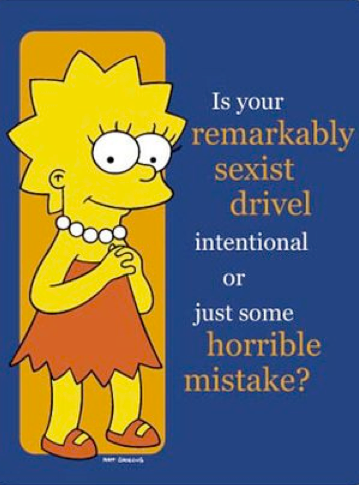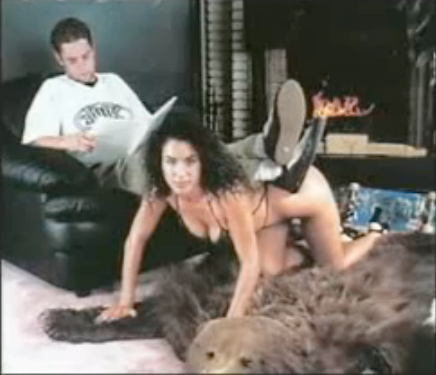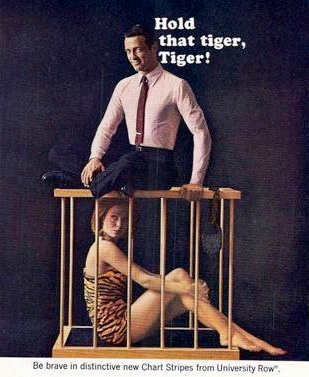
Rep. John McCain once joked that women enjoy being raped by a gorilla:
Did you hear the one about the woman who is attacked on the street by a gorilla, beaten senseless, raped repeatedly and left to die? When she finally regains consciousness and tries to speak, her doctor leans over to hear her sigh contently and to feebly ask: "Where is that marvelous Ape?"
No apology from this presidential candidate for his 1986 joke. His spokesman explained that this was a "good example of McCain being McCain."
Is a rape joke less offensive when told by a progressive, like George Carlin?
Some guy broke into a house and stole a lot of things and while he was in there, he raped an 81-year old woman. And I'm thinking to myself … WHY? What the fuck kind of social life does this guy have?
Testing the humor value: Would the audience laugh if the women had been tortured or murdered? All three are violent crimes. These jokes say that rape is not a violent crime, but a matter of the man's prerogative or the type of sex women crave. These are not isolated messages when some people still debate whether rape is a violent crime or crime of passion.
Is it funny when David Letterman jokes that Sarah Palin is a slut? What if the target was Hillary Clinton or Michelle Obama: Would Letterman's audience still applaud? Is it funny when some police in 2011 still blamed women for rape, advising it can be avoided if women stopped "dressing like 'sluts.'"
When jokes, ads and hate speech dehumanize or disrespect women, their messages are not somehow enclosed in a bubble. Rather, the sexist messages communicated become part of our social and political discussions.
Our laws generally reflect our societal values, and thus murder is a crime because we place a value on life. However, when there are divergent values, it is the values of the empowered that become law, and this is what happened with women. Men created laws that gave them power and control over women based on sexist stereotypes.
Jokes and words that show hatred, discrimination, objectification or dehumanization of women need to be considered against the history of laws that deemed women to be property that men had a lawful right to beat and rape, all in the name of men's "interest" or ownership of our bodies and control over what rights we have in society. The laws have changed over the years but the sexist messages are generally the same.
Today, the worst of these laws are gone in America. However, embedded attitudes that created these laws have not been extinguished. Sexism is an ideology of oppression based on social attitudes and stereotypes that cannot be divorced from its history. Some of that history is reflected in court opinions since the 1800s that show that much of the sexism, hatred and disrespect of women today is part of the continuing legacy from over 100 years ago. Our institutions, laws and policies (and the failure to enact some laws or fully enforce those that have been enacted) still reflect this legacy of hatred and discrimination; and, for women of color, the additional oppression from the intersection of racism and sexism.
Laws dehumanized women into property owned by men.
Historically, men gave themselves a privilege of ownership and entitlement over women by enacting laws declaring women as property and chattel, similar to cattle or furniture. In 1984, a court recognized how this historical objectification "demeaned" women by the "denial of a separate legal identity and the dignity associated with recognition as a whole human being." When women have the legal status of less than a whole human being, the consequences flow like a stream with branches and the branches have branches, flowing through all the institutions of society.
In the marital stream, husbands made unilateral decisions because married women did not have the right to vote, execute wills or contracts, own or inherit property and husbands controlled their wages based on sexist stereotypes that women can't think and need a man to govern them.

This dehumanization of women then begot more laws that authorized men to beat women except "no husband shall beat his wife after ten o'clock at night or on Sundays." These chastisement laws or legalized beatings were enacted to give men the privilege to discipline their property. Under the "Rule of Thumb", a husband could beat his wife with a "rod or switch as long as its circumference was no greater than the girth of the base of the man's right thumb."
Changing archaic sexist views does not come easy. More than a century after courts rescinded men's privilege to beat women, a court in 1984 boldly stated that "any notion of a husband's prerogative to physically discipline his wife is an 'increasingly outdated misconception.'"
Chastisement laws were rescinded but not before begetting men's privilege or immunity from enforcement measures to protect women. During the chastisement years, husbands evaded criminal assault charges because wife beating is such a "trivial complaint", "just a private family matter" that "ought to be left to family government." This view persisted over the years, replacing chastisement laws with a legal system that condoned violence against women by not providing them with legal protection from beatings. In 1945, a California statute criminalizing wife beatings was held unconstitutional. In the 1960s, criminal courts transferred domestic violence cases to family courts, which applied civil laws. In 1966, grounds for divorce included beatings when there was proof of a "sufficient" number of beatings. In the 1970s, many cities denied welfare to battered women who left their husbands.
Even when the law changes, society or institutions tend to continue the laws of the past. By 1975, most states allowed wives to file criminal actions against husbands for physical injuries. For these actions to be effective, however, the courts had to enforce them, and some failed to do so. In 1992, Chief Justice Rehnquist opposed the proposed Violence Against Women Act that allows women to sue attackers in federal court, claiming the VAWA could "involve the federal courts in a whole host of domestic relations disputes" or just a private family matter that is best handled by "family government." In 2000, Rehnquist wrote the decision that held key part of VAWA unconstitutional.
Women's status as chattel begot men's privilege of rape. In 1857, a court recognized the "spousal rape exemption" where "marriage to the victim was a defense to rape" because men owned their wives so "rape was nothing more than a man making use of his own property." Courts did not really address the view that it was "legally impossible" for a husband to rape a wife until the late 1970s. At that time, some courts decided that criminal rape liability was appropriate in some cases. Other courts rejected the chattel rationale because state laws now recognized women as having a variety of legal rights.
However, even in 2006, a Maryland court interpreted a rape issue based on the ancient views of women as chattel, saying it was bound by precedent until the legislature or state supreme court changed it. Those ancient views were how the rape of a virgin constituted an "illegal trespass upon the father's property" because of the husband's or father's "interest in a woman's sexual and reproductive functions." Today, right-wingers advocating right to life (only on the issue of abortion) are, in effect, clinging to this archaic view of men's vested "interest" in women's reproductive functions that would be violated by laws giving women control over our bodies.
Since 1993, marital rape has been illegal in every state, but often rape and spousal rape are separate offenses with different requirements and can have different penalties. Some states also provide exemptions from marital rape. Even today, some people believe that spousal rape simply does not qualify as rape.
Some also believe that Black women can not be raped for additional reasons that date back to slavery. Historically, enslaved women were not protected from rape or other sexual atrocities due to a belief that they were sexually promiscuous and immoral. These views continue today. One 1995 study found that when the rape victim was Black, college "students were less likely to define the incident as date rape, to believe the crime should be reported to the police, and to hold the perpetrator accountable." Students also believed that a "Black date rape victim was not only less truthful, but also more responsible for her sexual assault than a White date rape victim."
Sexism today needs to be viewed against this history of laws dehumanizing women as less than a whole human being because the issues today are often a progeny of the past.
It's not funny that Bill O'Reilly said that the Dixie Chicks were "callow, foolish women who deserve to be slapped around" because they opposed Bush's illegal war in Iraq.
It's not funny when Larry the Cable Guy told a "joke" on the Tonight Show in 2006: What do you call a movie of "an Indian woman who found religion?" Punch line: The "Squaw Skank Redemption." (The word "squaw" is racist and sexist. Some Indians interpret as a perjorative that is the equivalent of "broad" with racial overtones and some interpret as an "ethnic slur for Indian women doubling for "c***.") This "joke" was such a hit, with little public outrage, that Larry repeated it in 2007 on Canadian radio, where it was "touted as one of the year's 'best.'"
A 1982 video game, called "Custer's Revenge," glorified the rape of Indian women: The objective was for Custer, naked with an erection, to rape an Indian woman tied to a cactus.
The 2008 video below shows a man playing the game, yelling out yeah, "fuck that bitch," "rape the shit out of her" while he explains that he is playing this game because he is "very sensitive to the plight of Native Americans." The terms "fucking" and "getting laid" are interchanged with rape. This player is not offended by rape, but seeks raping that is more challenging and of longer duration.
Jokes about this kind of violence are especially offensive because indigenous women are at least 2.5 times more likely to be raped or sexually assaulted than any other women in the U.S. and 86% of the time by non-Native men, again showing racism's impacts.
Dehumanizing women into objects or property continues today. While the laws declaring women to be property are gone, our society still daily pounds out the message that women are not human, but objects. One wide-reaching medium has been ads: In 1999, the average American was exposed to 3,000 ads per day.
Ads can dismember our bodies, making women part of an object, like a suitcase or bicycle:

Photo Source

Photo Source
Some ads transform our bodies completely into an object, like a table.

Photo Source
Or footrest:

Photo Source
Other ads dehumanize women by suggesting we are animals, often shown in cages, sending messages women are not human and need to be captured and controlled.

Photo Source

Photo Source
The dehumanization messages in ads reflect the views of some in society, views not limited to ads. For example, in 2010, anti-abortion groups claimed that "black women have so many abortions that 'black children are an endangered species.'"

Photo Source
While laws no longer state that women are property, their legacy lives on today because the underlying beliefs that triggered them continue today.
Sexist jokes and hate speech objectify, disrespect, demean and marginalize women and serve as a tool to maintain stereotypes harmful to women. The top progressive blog in the world should not be promoting sexism. Yet, a search of comments at DK found 188 results for "squaw," 3,162 for "cunt," 11,846 for "pussy," 3,520 for "bitch slap" and 79,690 for "bitch." (26,084 for 01/01/2004 to 12/31/2006; 40, 573 for 01/01/2007 to 12/31/2009; 10, 551 for 01/01/2010 to 12/31/2010 and 2,482 for 01/01/2011 to 4/30/2011. I was unable to get search results for the rest of this year for "bitch.")
Today, there is a war on women, equal pay remains out of reach, and 80 new laws to control our reproductive functions were passed this year. Although Rep. Carolyn Maloney will be reintroducing in Congress this year, there is still no Equal Rights Amendment. We should not pretend that sexist words, jokes and images are not part of this damaging situation. So, can we just stop? It might seem like just words to some people, but these words have consequences, not the least of which is a continuation of the dehumanization that began when women were chattel.


